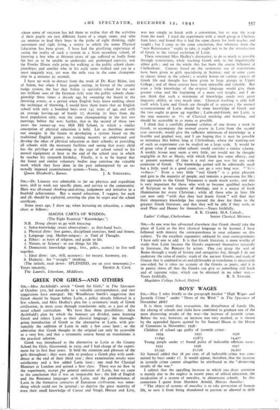GREEK FOR GIRLS-AND OTHERS
Sta,—Miss Archibald's article " Greek for Girls," in The Spectator of October 3rst, led naturally to a valuable correspondence, and two suggestions have emerged: Mr. Woodhouse Smith's suggestion that Greek should be begun before Latin, a policy already followed in a few schools, and Miss Hedley's plea for a systematic study of Greek civilisation, in most cases through translations only, as a part of the usual school curriculum. We have thus three possibilities: Miss Archibald's plan by which the honours are divided, some learning Greek and others Latin as their classical language ; the thorough- going introduction of Greek as the alternative to Latin, with pre- sumably the addition of Latin in only a few cases later ; or the admission that Greek thought in the original can only be accessible to a very few, and that a systematic course based on translations is the practical solution.
Greek was introduced as the alternative to Latin at the County School for Girls, Gravesend, in 1919, and I had charge of the experi- ment for its first four years. It held the attention and pleasure of the girls throughout ; they were able to produce a Greek play with confi- dence at the end of their third year ; their examination results were satisfactory and a few added Latin later ; one read for Classical Honours at London and gained a first class. There was no flaw in the experiment, except Jhe general omission of Latin, but we came to the conclusion that it was an irreparable loss ; the link of English and the Romance languages with Latin, and the predominance of Latin in the formative centuries of European civilisation, was some- thing which could not be ignored ; to deprive the great majority of even their small knowledge of Caesar and Vergil, Horace and Livy, was not simply to break with a convention, but to tear the warp from the woof. I tried the experiment with a small group at Chelten- ham later, and found that it had the same charm for both teacher and taught ; but I came to the same conclusion, that whatever form the " new Renaissance " ought to take, it ought not to be the introduction of Greek to the virtual exclusion of Latin.
There remained Miss Hedley's alternative, to do as much as possible through translations, while teaching Greek only to the linguistically ablest girls ; and on the whole this has been the course followed at Cheltenham. Courses based on the systematic use of translations have been given to girls specialising in Science, and in some cases to classes lower in the school ; a weekly lesson on various aspects of Greek life and thought has been given to large groups in Upper College ; and all these courses have been enjoyable and valuable. But even a little knowledge of the original language would give them greater value and the beginning of a more real insight, and I do not think that such a minimum of knowledge needs very great linguistic ability, or very much time. Classical teaching is only half itself while Latin and Greek are thought of as separate ; the normal accompaniment of Latin should be some knowledge of Greek and the two ought to grow up together ; Latin-and-Greek, not Latin, is the true eateries or An of Classical teaching and learning, and should be accessible to as many as possible.
I think that a carefully planned syllabus of one lesson a week in Greek, to accompany the normal course in Latin from the second year onwards, would give the sufficient minimum of knowledge in a feasible and gradual way, and I am hoping that it may be possible to introduce this before long at Cheltenham, where the working-out of such an experiment can be studied on a large scale. It would be of great value if some other schools would consider a similar scheme. A weekly lesson may seem a very little, yet would not be thought negligible in Art or Music, with which Greek has some affinity; and at present economy of time is a real sine qua non for any wide extension of Greek. The knowledge gained will be admittedly small but a little, used in a good cause, can go a very long way. " "Eo'rt watatipLow." Even a very little "real Greek" is a great pleasure and gain to the majority of people, and remains a possession for life ; the approach to the Greek Testament is made much easier, and this is very important for those who wish to become qualified teachers of Scripture or for students of theology, and is a source of fresh illumination for every Christian ; while all those who in later life can now only " wish that they had learnt Greek " will find that their elementary knowledge has opened the door for them to the greatest Greek literature, and that they will be able if they wish, to read Plato and Homer for themselves.—Yours faithfully, A. K. CLARKE, M.A. Cantab., Ladies' College, Cheltenham. Senior Classical Mistress.


























 Previous page
Previous page